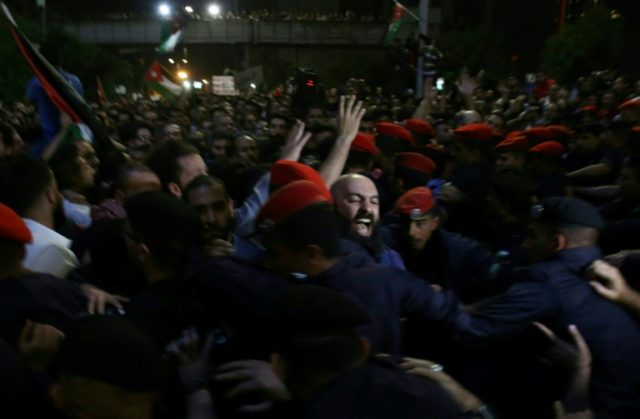Amman (AFP) – Jordan’s King Abdullah has summoned the prime minister for a meeting that could pave the way for his resignation, a government source said Monday, after another night of protests against austerity measures.
Demonstrations have rocked the Jordanian capital and several other cities since Wednesday against a draft income tax law and price hikes based on recommendations by the International Monetary Fund.
Protesters have called on Prime Minister Hani Mulki to step down, vowing they will not “kneel” and earning support from trade unions as well as a majority of MPs opposed to the new taxation.
“King Abdullah has summoned the prime minister to a meeting before noon today Monday that could pave the way for his resignation,” said the government source who declined to be identified.
It came hours after around 5,000 people rallied outside Mulki’s office in Amman, on the fifth consecutive day of protests in the Jordanian capital and other cities.
“Oh Mulki listen well, the people of Jordan will not kneel,” they chanted as they faced down a heavy security presence.
Some demonstrators held up signs that read: “We will continue (to protest) until the government quits”.
Jordan, a mostly desert kingdom with few resources, has seen prices of several basic goods and services like bread, fuel and electricity steadily rise over the past year.
At dawn Monday, Crown Prince Hussein bin Abdullah visited the protest site outside the prime minister’s office and spoke to security forces who had deployed en masse to keep protesters at bay.
“They must be able to express themselves and voice their opinions and our duty is to protect them,” the crown prince told security forces in reference to the protesters.
“We and they support the King. We want to protect this country,” he added.
Last month, the government proposed a new income tax law, yet to be approved by parliament, aimed at raising taxes on employees by at least five percent and on companies by between 20 and 40 percent.
The measures are the latest in a series of economic reforms since Amman secured a $723-million three-year credit line from the International Monetary Fund in 2016.
The protest campaign started on Wednesday when hundreds responded to a call by Jordan’s trade unions by flooding the streets outside the headquarters of the federation of unions.
Since then nighttime protests have gripped Amman and other major cities in the cash-strapped country of 9.5 million.
According to official estimates, 18.5 percent of Jordan’s population are unemployed, while 20 percent are on the brink of poverty.
The Economist Intelligence Unit earlier this year ranked Jordan’s capital as one of the most expensive in the Arab world.

COMMENTS
Please let us know if you're having issues with commenting.